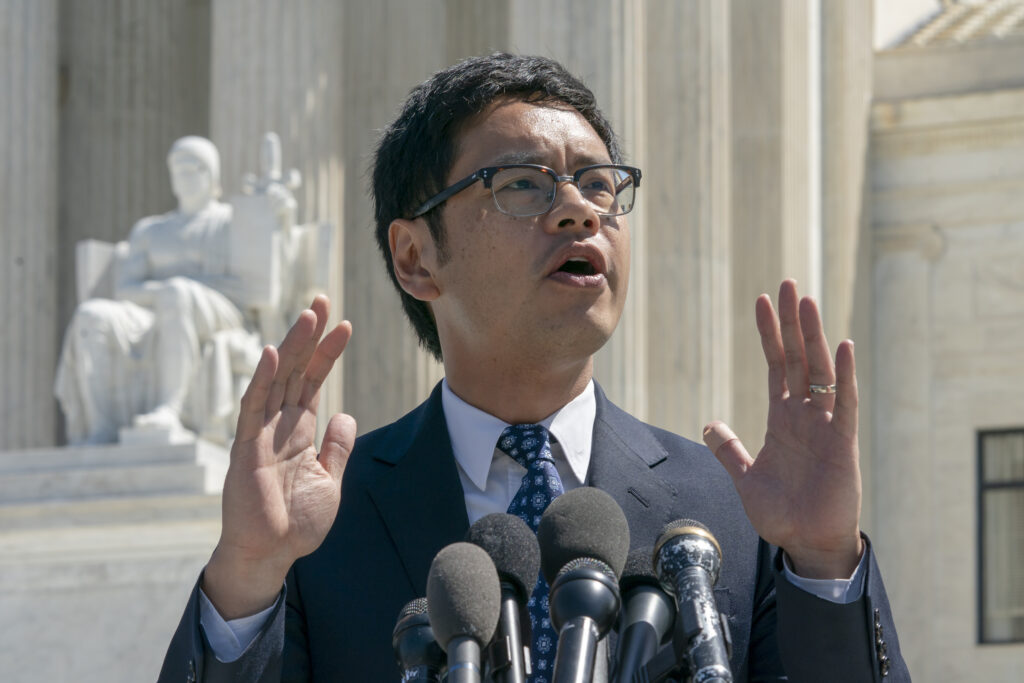Could Liberal Judge, Supporting Danielle Sassoon, Snub Trump and Refuse To Dismiss Charges Against New York City’s Mayor?
The star prosecutor not only resigned, but she offered a rationale for why the trial judge — and possibly the Second Circuit — could deny a dismissal.

The Department of Justice’s motion to dismiss the criminal bribery charges against Mayor Adams — after a revolt among senior prosecutors — sets the stage for further drama from the bench.
The motion, which bears the name of the acting deputy attorney general, Emil Bove, is, in a formal sense, merely a request that the presiding judge, Dale Ho, dismiss the charges against Hizzoner “without prejudice.” That means that they can be refiled.
Judge Ho was appointed to the bench in 2023 by President Biden after a long career of liberal activism, including as an attorney for the ACLU and an NAACP “fellow” at a white shoe law firm. His work at the forefront of the legal battles against Mr. Trump during his first term were featured in the actress Kerry Washington’s anti-Trump documentary, “The Fight.” During his confirmation hearings, Mr. Ho apologized for his past “overheated rhetoric” on social media, where he had denounced Republican members of the Senate Judiciary Committee.
The acting United States Attorney for the Southern District of New York, Danielle Sassoon, resigned rather than make the motion asking Judge Ho to dismiss the charges. Ms. Sassoon, who is 38 and was named to the fleeting role by President Trump, was not the only prosecutor who resigned.
The case’s lead prosecutor, Hagen Scott, who served in the Army Special Forces in Iraq and Afghanistan, wrote in a letter that “our laws and traditions do not allow using the prosecutorial power to influence other citizens, much less elected officials.” In total, seven senior prosecutors have resigned.
Ms. Sassoon’s own letter to Mr. Bove outlining her reasoning in respect of the prosecution of Mr. Adams reckoned that she expects Judge Ho to “conduct a searching inquiry” into the terms under which the case is dismissed. That could take the form of a hearing in court where Judge Ho could ask the DOJ to unpack its logic under sustained questioning from the bench.

Mr. Bove’s command to Ms. Sassoon to dismiss the case disclosed portions of Main Justice’s reasoning. He contends that the SDNY “has no authority to contest the weaponization finding. The Justice Department will not tolerate the insubordination.” He insists that Ms. Sassoon has “lost sight of the oath” that she took when she “started at the Department of Justice by suggesting that you retain discretion to interpret the Constitution.”
Judge Ho could decide to probe Mr. Bove’s argument that the case “improperly interfered with Mayor Adams’ campaign in the 2025 mayoral election” and has “restricted Mayor Adams’ ability to devote full attention and resources to the illegal immigration and violent crime that escalated under the policies of the prior Administration.” Mr. Bove has disavowed any consideration of the merits of the case first brought by the previous United States Attorney for the SDNY, Damian Williams.
If Judge Ho does deny the motion to dismiss, the DOJ would likely appeal that decision to his appellate superiors, the Second United States Appeals Circuit. Denials of motions to dismiss are rare. Most recently, the 11th United States Appeals Circuit granted the DOJ’s motion to dismiss an appeal in the classified documents case brought by Special Counsel Jack Smith. Federal courts also agreed to Mr. Smith’s request to drop charges against Mr. Trump following his victory over Vice President Harris in November.
Now Ms. Sassoon wants Judge Ho to break that pattern. She alleges that the Trump administration has come to a “quid-pro-quo” with the mayor, whereby Washington would dismiss the charges in exchange for cooperation on immigration policy. She writes that such an arrangement is grounds to deny a motion to dismiss and argues that Judge Ho is “unlikely to acquiesce in using the criminal process to control the behavior of a political figure.”
One thing that may come into focus is a distinction between a quid pro quo and a condition of a dismissal, a strategy that is not unknown in criminal law. Then there is the presidential power to pardon which is vouchsafed in the Constitution, extends to all “offenses against the United States,” and is one of the least fettered of all presidential prerogatives.
Ms. Sassoon takes care to distinguish her case from the prosecution of General Flynn, who pleaded guilty to two crimes only for the Trump administration to move to vacate those guilty pleas and cancel sentencing. The presiding judge, Emmet Sullivan, denied that motion, and Mr. Trump subsequently issued a pardon to the general. The 47th president could yet pardon Mr. Adams.
Ms. Sassoon explains that the DOJ in that case moved to dismiss the charges against General Flynn “with prejudice” — meaning that they could not be refiled — because the government determined that the evidence was insufficient to convict. Here, she writes, “no one in the Department has expressed any doubts as to Adams’s guilt.” Such doubts, the courts have held, would amount to the “quintessential justification for dismissing charges.”
Even if Judge Ho and the Second Circuit agree with Ms. Sassoon, it is difficult to envision how the case could move forward as what the Constitution calls a “case” or “controversy” without a prosecutor to pursue it to a conviction.

